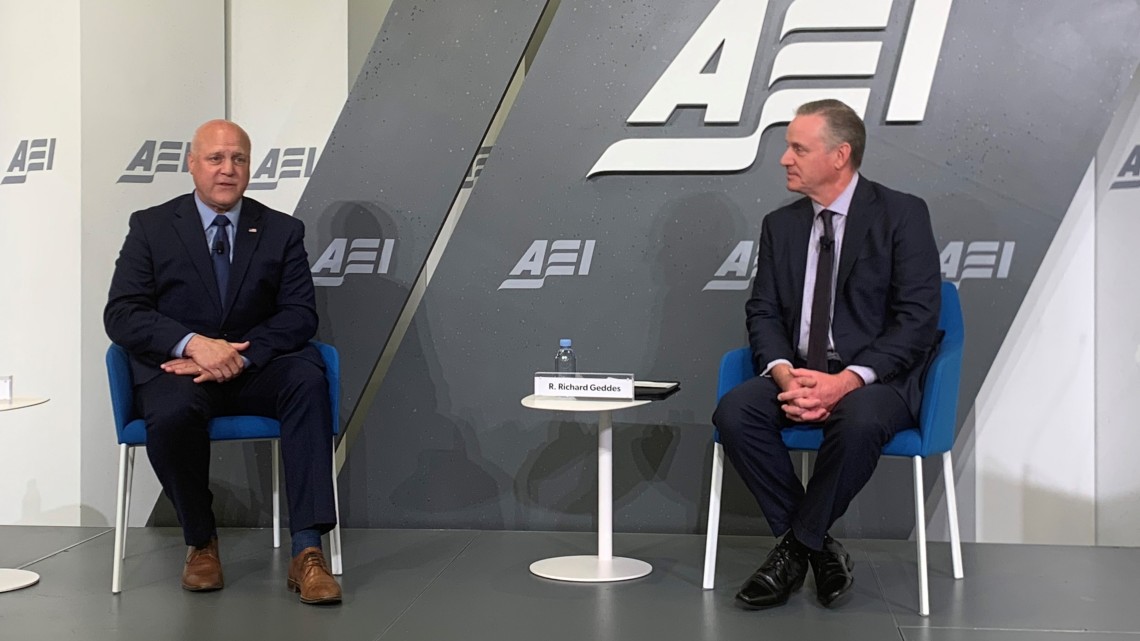
Mitch Landrieu (left) is interviewed by Richard Geddes, a professor in the Cornell Jeb E. Brooks School of Public Policy, and founder of the Cornell Program in Infrastructure Policy. Landrieu, an advisor to President Biden on infrastructure, emphasized the importance of workforce development when he spoke to an audience at the American Enterprise Institute in Washington, D.C.
News directly from Cornell's colleges and centers
White House adviser Landrieu, industry leaders tout infrastructure progress
By Jim Hanchett
Fast progress is being made implementing the nation’s massive infrastructure spending law, but challenges remain, according to White House infrastructure czar Mitch Landrieu and three industry leaders who spoke at a Cornell-sponsored event in Washington, DC this week.
The event at the American Enterprise Institute (AEI) was organized jointly by AEI and the Cornell Program in Infrastructure Policy (CPIP) at the Cornell Jeb E. Brooks School of Public Policy. CPIP academic director Rick Geddes moderated the discussion. He is also a Nonresident Senior Fellow at AEI.
Congress passed the Infrastructure Investment and Jobs Act nearly one year ago and Landrieu noted the size and scope of the law is unprecedented. “It’s $1.2 trillion, that’s a big number, it’s a lot of zeros, it’s the biggest thing we’ve done in terms of direct federal investment since President Eisenhower’s bill built the interstate highway system,” Landrieu said. “So, we really have to think about what it is that we want to build, where we want to build it, who is going to do it, when is it going to get done by, and what we want it to look like and hope we come in on time, on task and on budget.”
Geddes peppered his questions to Landrieu with references to New York state projects and to his CPIP research and teaching. He described the potential of P3 partnerships between governments and the private sector to build public infrastructure. “I tell my classes this, the United States is behind in innovating partnerships between the private sector and the public sector,” Geddes said. Landrieu agreed.
Landrieu is a former mayor of New Orleans with an official title of White House Senior Advisor and Infrastructure Implementation Coordinator. He is implementing a law that funds construction of roads, bridges, airports, ports, waterways, high speed internet, environmental cleanups, and building a green energy economy. “I think it is going pretty well,” Landrieu contended, noting that $180 billion has already been spent and five thousand projects are under construction.
He cautioned, though, that there are challenges. Those include quickly securing building permits, getting technical expertise to rural areas and small towns, and hiring and training a specialized workforce.
After Landrieu’s remarks, Geddes moderated a panel discussion with three industry leaders.
Jeff Weiss ’79, a CPIP board member and member of the Cornell Trustee Council, highlighted the clean energy development funded by the infrastructure law and the subsequent passage of the Inflation Reduction Act. “The laws are important because they’re giving us rocket fuel and the rocket fuel is critically important to accelerate the transition to a more sustainable energy supply,” Weiss said. He serves as Executive Chairman of Distributed Sun, a solar and renewable developer that builds community and utility solar farms and helps Fortune 500 companies mitigate greenhouse gas emissions.
Jim Tymon, executive director of the American Association of State Highway and Transportation Officials, praised the work of the Biden Administration in securing bipartisan support in Congress for the infrastructure bill. “We think this bill provides a great foundation and platform for us to build a safe, sound and smart transportation system so that it can be resilient for generations to come,” Tymon said.
Patrick Foye, former chairman and CEO of the Metropolitan Transportation Authority (MTA) in New York City, echoed Landrieu’s concerns about the labor supply necessary to carry out the projects now in the planning stages. Foye currently serves as CEO of ASTM, a P3-focused firm that specializes in greenfield projects. “Infrastructure jobs aren’t jobs, they’re careers,” Foye said. “They’re high paying jobs with quality benefits and the opportunity to have a lifetime job and a job in which challenges increase. It’s not only construction, but also technology, it’s cyber, it covers a broad spectrum of the US economy.”
AEI videotaped the discussion. It can be seen here and it was also aired by CSPAN.
Landrieu and the panelists are the most recent high-profile guests to speak at CPIP events. Drawing expertise from more than a dozen Cornell departments and schools, CPIP researches and analyzes policies that influence the delivery of infrastructure projects – from their selection, funding and financing through design, permitting, construction, operations, and maintenance.
Media Contact
Get Cornell news delivered right to your inbox.
Subscribe
